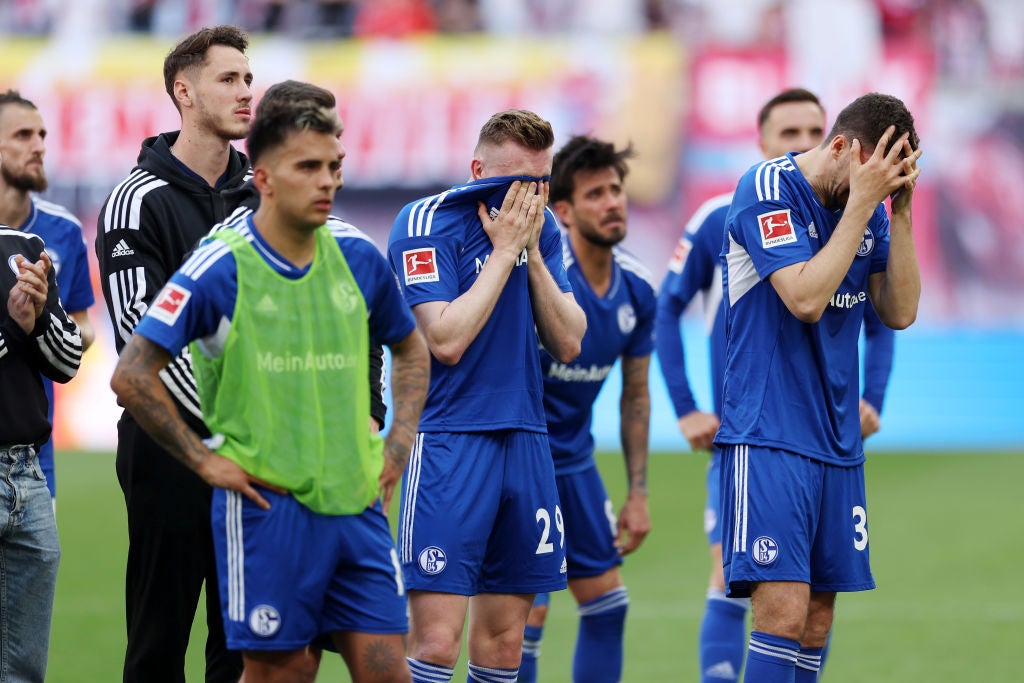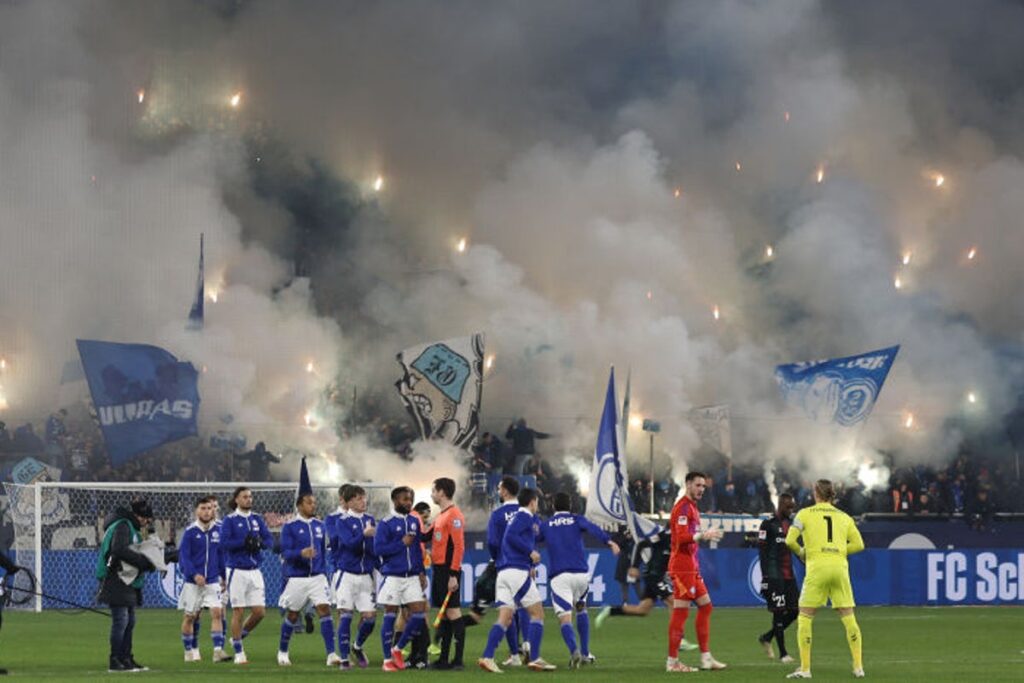“A thousand friends who stand together, then FC Schalke will never sink.”
The final line of Schalke 04’s official club anthem, Blau und Weiß, wie lieb’ ich dich, feels rather pertinent in light of recent seasons. It’ll be heard and sung on Saturday as the Royal Blues do battle with once-titans of Europe Hamburger SV – likely in front of a sold-out crowd – but will come under far more humbling circumstances than it would have maybe a decade ago.
Schalke were tussling with the continent’s elite then. Gelsenkirchen is familiar with the jeopardy a Champions League night can bring, having appeared in the competition eight times over the past 20 seasons. In 2011, they managed to go as far as the semi-finals, with Ralf Rangnick’s star-studded team – boasting the likes of Raul, Manuel Neuer and bona fide club icon Klaas-Jan Huntelaar – only missing out on a final trip to Wembley at the hands of Manchester United.
Jeopardy is still commonplace on matchdays at the Veltins-Arena – but the prospects that come with it are far more morbid. Once a staple of German football’s upper echelons, Schalke are now dangling by a thread in the country’s second division and have already begun to flirt with relegation to the third. The club are devoid of inspiration, both on the pitch and behind the scenes.
Schalke are not alone in obscurity, however. They are a fallen giant in a sea of fallen giants that is the German second tier.
There is no reminder of football’s fragility more poignant than the one that comes by simply glancing at the Bundesliga 2 table, the like of which you won’t see in another other sub-premier division in world football. From national champions to European champions, many are a shadow of their former selves. But the undying support they receive has hardly changed.

Take 1. FC Kaiserslautern, for instance. Kaiserslautern are four-time German champions, last lifting the Meisterschale in 1998, and one of the Bundesliga’s founding members. They play at the compact yet impressively overbearing Fritz-Walter-Stadium, which can hold nearly 50,000 fans in its four steep stands – almost half the population of the city it’s plonked in. The club regularly records attendances of 40,000-plus – an impressive turnout for a top-flight team, let alone a side that three years ago were playing their football in the third tier. The Red Devils have not seen the light of the Bundesliga since 2012, but the fans still turn up in their droves.
Kaiserslautern are not simply an anomaly. The likes of Hertha Berlin, Nuremberg and Hannover 96 are among the array of second-division clubs that pack their rafters with tens of thousands every other week, despite having often endured years of struggle. Glory hunters do not exist in these parts.
How German football has come to be this sanctuary for supporters all boils down to the country’s famed fan-first culture. The most wide-reaching example of this is the 50+1 membership regulation that prohibits outside investors from becoming majority stakeholders. In an era where clubs are stripping their identity and alienating their fanbases in the sole pursuit of profit, Germany has barriers in place to protect its outfits from losing touch with their roots. Add cheap ticket prices to the mix and football is more accessible here than anywhere on the continent.
Clubs are at the centre of communities, and it’s why attendances are so regularly through the roof, even when teams are enduring an era of underperformance. So strong is the football culture that in 2024, the Bundesliga 2 ranked as the fourth-best attended league in Europe as per a Uefa report, surpassing Spain’s La Liga and France’s Ligue 1.
That brings us back to Schalke, who amid their stark decline have become the latest to demonstrate that even when you stop winning, the turnstiles keep spinning. With an average attendance of 61,191 – filling out 99 per cent of its total capacity – Schalke were one of just two second division sides in the whole of Europe to boast an aggregated attendance of over one million across the 2023/24 campaign. The other was Bundesliga 2 rivals Hertha. Despite crisis on the pitch, there really is a feeling that Schalke will never die, so long as those 62,000-odd friends continue standing together.
Usual matchday proceedings will take shape outside the Veltins as they come up against Hamburger, whose fall-off has been greater than any.
They were continental goliaths in the 20th century. On top of six Bundesliga titles, they are one of only three German clubs – along with perennial big-hitters Bayern Munich and Borussia Dortmund – to win the European Cup, beating Juventus to the crown in 1983. Yet for the last seven years, the outfit have been without top-flight football.
This could be about to change. Hamburger currently sit atop the Bundesliga 2 on 52 points, but have 1. FC Koln, SV Elversberg and Fortuna Dusseldorf breathing down their neck with five games to play. They will be desperate to claim at least one of the two automatic promotion places, having come out on the losing side of the promotion play-off twice in the last three seasons.
For Schalke, Hamburger’s current position will be one to envy. Having flirted with back-to-back relegations this season, how long it takes the former Champions League contenders to climb back up the ranks is anyone’s guess. Should their Saturday opponents complete their return to the Bundesliga in the coming weeks, it will act as a timely reminder that there is indeed scope for fallen giants to one day return to grace.
But regardless of results, the fans will keep turning up and taking their seats in Gelsenkirchen – as they will for each and every club in this remarkable, refreshing division.
Read the full article here


